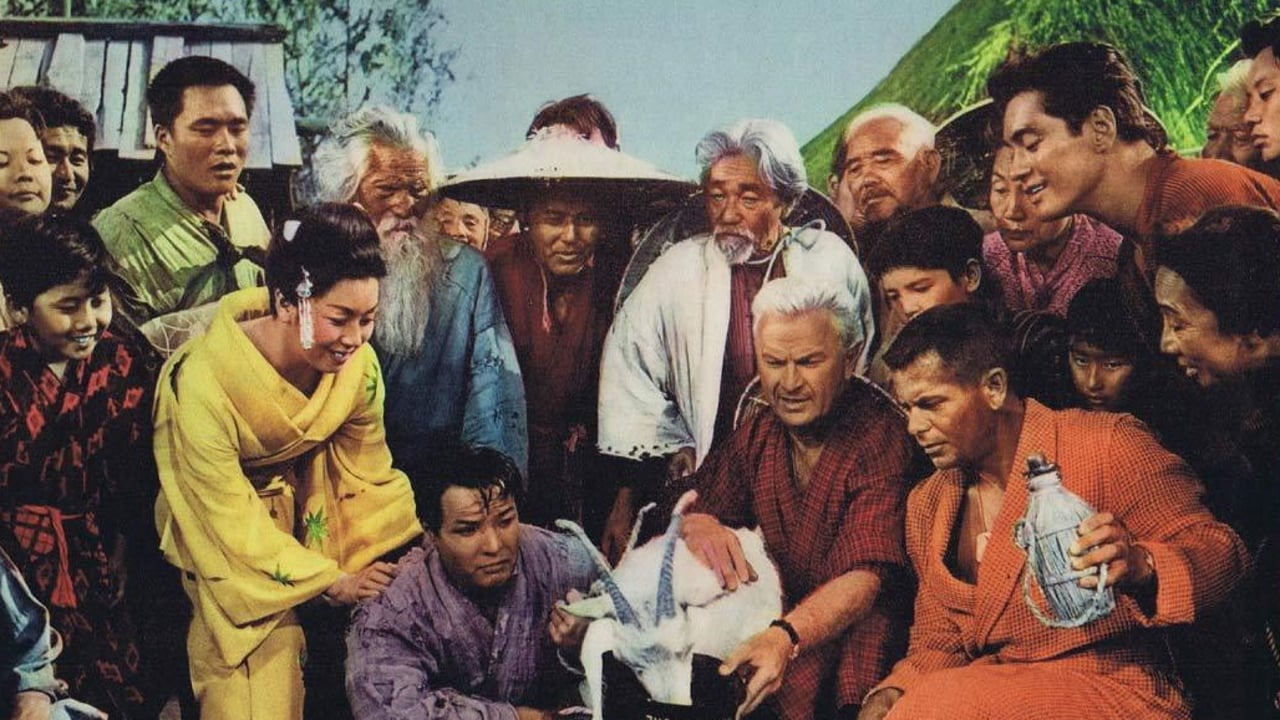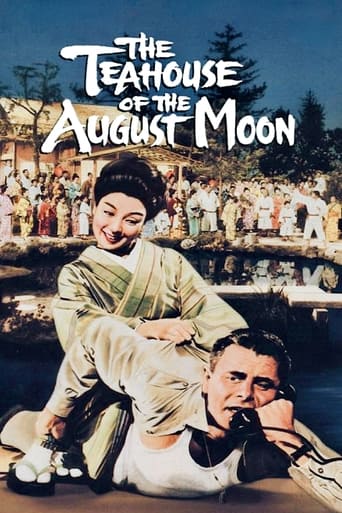Edgar Soberon Torchia
I saw «The Teahouse of the August Moon» today for the third time. The first time I watched it I was a small boy and it remained in my mind as something very pleasant. Then, a few years ago, I saw it again and thought that it had "graciously passed the test of time". Today I made an introduction about it for the personnel of the Electoral Court of Panama, as «The Teahouse…» started a series of film projections with later discussions about themes, subjects, situations, concepts contained in cinema. Movies like this one raise questions about democracy, military occupation, the meeting of cultures, the oppression of one culture over people from a different place with a different worldview, imperialism and so on. It is still an enchanting comedy with bright touches of satire, a few old- fashioned jokes and moving realizations by ordinary people –both American and Japanese-, which compensate for its artificiality, verbosity and Marlon Brando's forced characterization of the Japanese narrator. It does so with film editing that gives good rhythm to the plot (which has by itself a lot of vitality in the way it was directed); fine and fluid camera-work and funny performances by Glenn Ford and Machiko Kyo (who also dances a beautiful choreography). The third part is excessively formulaic in order to reach a cheerful conclusion, but it is after all a product of a time of world tension and political struggle, and in those situations, people ask for happy endings. Those were the days of the Cold War after World War II, with the anti-communist witch-hunting still fresh in everybody's minds, and the Hays Code still ruling the representation of life in all its manifestation, most notable eroticism, which is a strong element in the story. Watch it, it is very good.
shopdiva3
The state of Japan after World War II was one of devastation. The war had left millions of people without homes and shortages of food, corrupt practices such as prostitution were on the rise, and the Japanese had drug and alcohol problems due to the depressing and hopeless conditions. Inevitably, this time in Japanese history was a subject that Hollywood could not resist. A few years after the end of the American occupation in Japan, one of many films about this time was produced; however, Hollywood decided to give this one had a comedic twist. Daniel Mann's The Teahouse of the August Moon takes place in the village of Topiki in Okinawa during the American occupation of Japan, and stars some of the 1950s most popular actors of the time, including Glenn Ford who plays the clumsy military Captain Fisby, Paul Ford (no relation) who portrays Colonel Purdy,and Eddie Albert, who plays psychiatrist Captain McLean. Although he is on screen for most of the film, Marlon Brando was unrecognizable to many audiences in his role as Sakini, the Japanese interpreter. The film also features Japan's popular and talented Machiko Kyo as the geisha Lotus Blossom who has been sent away from numerous other occupation villages due to the never specified "trouble" that she had reportedly caused. Based off of the play of the same name, The Teahouse of August Moon sends many mixed messages about Japanese and American relations after World War II. In the film, the army instructs the inept Colonial Fisby to be in charge of the building of a new schoolhouse, which is to help the American's integration of democracy in the village. Through the verbal "trickery" of Sakini, the locals persuade Fisby to have a teahouse built instead. As they say in the industry, and hilarity ensues.The film was advertised to the public as a satire on American politics, and, unfortunately, most of the public and even some critics were fooled the marketing ploy. To put things into perspective, the dictionary definition of satire is "A thing, fact, or circumstance that has the effect of making some person or thing ridiculous," and if anyone is made out to look ridiculous in the film, it's certainly the Japanese. Primarily, not only was casting Marlong Brando in the role of the Sakini a horrible decision, it was also offensive and insulting. The film came out shortly after the occupation had ended, and, without the access of the current twenty-first century media, Teahouse was one of the only ways that Americans were to obtain images and feelings toward and Japanese people and their history and culture. The fact that the starring role was played by a non-Japanese already sends out a powerful message to the public. There were bilingual Japanese actors at the time; the fact that the Japanese were not even allowed to represent themselves immediately sends a superiority implication. Secondly, the film is strong, yet subtle in its ridiculing of the Japanese that many people don't even realize what their brain is absorbing. Only upon paying close attention to the dialog and aesthetics of the film that audiences can see and hear the exact message that the film was sending. For instance, in the beginning of the film during a scene between Sakini and Colonel Purdy, and later Captain Fisby, Purdy offhandedly murmurs comments such as "Can't you natives ever learn anything about custom?" and later when Fisby offers to learn the language, Purdy replies "No need; we won the war!" These comments, which were intended to and do have audiences laughing, are putting the image of Japanese people being dumb and unable to learn, and insignificant and that people shouldn't and don't have to learn about their culture.Although the film is stained with the fore mentioned vulgarities, some of the actor's performances and beautiful, although most likely inaccurate, set designs cannot go unnoticed. Despite the fact that she speaks solely Japanese and never has subtitles beneath her, Machiko Kyo was able to communicate through body language most of what she was saying, and this cannot go unrecognized, although her portrayal of a geisha is far from accurate. Her, as well as Eddie Albert, Glenn Ford, and, unfortunately, Marlon Brando all received Golden Globe nominations, but all failed to bring home the award.Although many people in today's society may roll their eyes at yet another attack of political correctness, it is essential to note that films, in both the past and present, shape people's perceptions of the world. Even fifty years later, many people don't take advantage all the media that they have access to, and get their views on the world from the latest gross-out comedies and Friday night television line-ups. Filmmakers need to take more responsibility for their films; even acknowledging that the Japanese were being ridiculed in Teahouse would have been a step in the right direction. Fortunately, the twenty-first century has brought the world and increasing number of films that not only have a conscious, but were also popular among critics and at the box office, such as Blood Diamond and An Inconvenient Truth. The Teahouse of the August Moon should be looked at as a shameful example in film history, and something to learn from for both filmmakers and the public. To add to the lesson, the film was nominated for was the Golden Globe award for "Motion Picture Promoting International Understanding". Fortunately, it lost.

